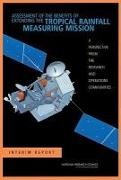Read more
Launched jointly in 1997 by the National Aeronautics and Space Administration (NASA) and the Japan Aerospace Exploration Agency (JAXA), the Tropical Rainfall Measuring Mission (TRMM) is a satellite mission that placed a unique suite of instruments, including the first precipitation radar, in space. These instruments are used to monitor and predict tropical cyclone tracks and intensity, estimate rainfall, and monitor climate variability (precipitation and sea surface temperature). TRMM has been collecting data for seven years; this data is used by the Joint Typhoon Warning Center, the National Center for Environmental Prediction, and the National Hurricane Center, among others worldwide. In July 2004, NASA announced that it would terminate TRMM in August 2004. At the request of the National Oceanic and Atmospheric Administration (NOAA), the White House, and the science community, NASA agreed to continue TRMM operations through the end of 2004. Meanwhile, NASA asked a National Research Council (NRC) committee to provide advice on the benefits of keeping TRMM in operation beyond 2004. After holding a workshop with a number of experts in the field, the committee found that TRMM will contribute significantly to operations and science if the mission is extended; and therefore, strongly recommends continued operation of TRMM with the caveat that cost and risk will need to be further examined before a final decision about the future of TRMM can be made.

